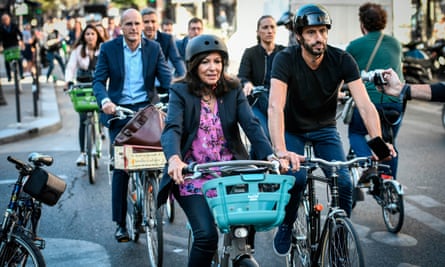Parisians living on the Boulevard Saint-Martin, a main east-west axis north of the Seine, last week found that the plane trees along their street had been “tagged” with graffiti. But it’s not new. Apartment doors, shop fronts, flower boxes, benches and lamp-posts have been covered in tags for weeks. Months even.
Along the boulevard to the landmark Place de la République – looking shabby despite a £20m facelift six years ago – the homeless dozed in doorways or on benches, sleeping bags pulled over their heads. The pavements were littered with abandoned electric scooters and bicycles, and punctuated by dog mess and cigarette ends. A man walking west opened a new packet of cigarettes and threw the cellophane and silver paper on the ground.
The city of light and of romance has become a dirty old town, or as locals have nicknamed it, Paris poubelle (dustbin Paris).
On Saturday, World Cleanup Day, Parisians were urged to pick up the mess they and visitors have made. “Paris is definitely getting dirtier. It’s filthy everywhere. The city needs an aggressive policy to make the streets cleaner and safer,” said Matthew Fraser, professor of communications at the American University of Paris, who has lived in the city for the best part of 30 years.
“Paris thrives on its own moral chaos. Nothing is organised, everything is urban anarchy. I don’t think Parisians notice it, because it’s their chaotic energy. But if you’re from the outside, or from another culture, the city is a mess.”
Parisians like nothing better than to grumble and today, the state of the city is the No 1 complaint. Next March, they will vote for a new mayor and propreté (cleanliness) will be high on their agenda as the city gears up for the 2024 summer Olympics.

The current mayor, socialist Anne Hidalgo, is favourite in the polls, but six months is a long time in politics. Her rivals are Benjamin Griveaux, the former spokesman for Emmanuel Macron’s centrist LREM party and the prize-winning mathematician Cédric Villani, also a member of parliament for the current government, who launched his campaign last Thursday.
Hidalgo, also president of the C40 Cities climate group, is popular with many Parisians – especially those that do not have a car – for her grand schemes to discourage vehicle use and tackle pollution by pedestrianising large swaths of Paris and digging up streets to create cycle lanes. But even her fans admit that rubbish is a growing problem.
City Hall spends €550m a year to get rid of the estimated 16 tonnes of dog dirt produced each day by the city’s 200,000 pets, 350 tonnes of cigarette ends, and empty 30,000 bins. And still the Paris poubelle nickname sticks. In 2016, Japanese tour operators and Japan Airlines became so worried about their compatriots being put off that they began spending weekends clearing the famous Trocadéro gardens of cigarette ends, beer cans and other detritus.
Ruth Grosrichard, a professor of Arab languages and civilisation, lives just north of Boulevard Saint-Martin, in the 10th arrondissement near the run-down Gare du Nord, one of the city’s busiest stations and home of the Eurostar terminus.
It is one of the most densely populated areas of an already crowded city; with almost 54,400 people per square mile, Paris is the most densely populated city in Europe. Manchester, which is a comparable size, has an average of 12,200 per sq mile. The northern district’s problems are compounded by a steady influx of migrants who, for want of homes, have set up encampments in the area.
Grosrichard, a campaigner with two community action groups, says for years the authorities have pushed the city’s problems – drugs, migrant camps, homelessness – away from the chic arrondissements to poorer districts in the north-east, creating a clear divide either side of the Seine.
“I take a metro from the northern district where I live to the southern district where I work and it’s like two different countries,” she said. “There is a lot of indiscipline and incivility and the trouble is degradation attracts more degradation, dirt more dirt. We need proposals to break the vicious cycle.”
The city has introduced “incivility brigades”, uniformed personnel with the power to fine people for leaving electric scooters or bikes on pavements (or for riding pavements on them), for dropping litter and for failing to clear up dog mess. But a poll of people on Boulevard Saint-Martin reported no sightings of them.
Gosrichard said: “I have never seen a single incivility brigade in our area. Not one. We keep asking city hall where they are, but we’ve never seen any. They spend millions on cleaning the city and it’s dirtier than ever before. We can’t let things go on as they are, that’s for sure.”
She added: “I’ve travelled to many other cities in Europe and elsewhere and Paris is definitely the dirtiest.”
Fraser believes the problems stem more from culture than cleanliness, accusing Parisians of lacking “personal responsibility”. “The French are used to the state taking care of all their needs, they feel little obligation to take responsibility for their own actions and their consequences,” he said. “Try not picking up after your pet dog in a park in London or New York, you will get scolded by someone. In Paris, people don’t even flinch.”
